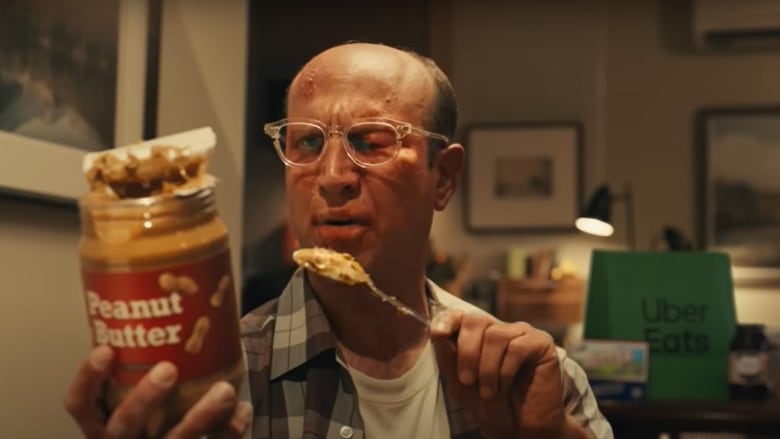Uber Eats will apparently remove a scene from its Super Bowl ad that depicts a man having an allergic reaction to peanut butter, following backlash from some consumers and food allergy advocates — a sticky situation that brand experts say could have been avoided.
The ad starts with a production assistant handing Jennifer Aniston a bag of fresh flowers, lotions and other goodies in a green Uber Eats bag. "I didn't know you could get all this stuff on Uber Eats," the woman says. "I gotta remember that."
"Well, you know what they say," Aniston responds, tapping her noggin. "In order to remember something, you've got to forget something else. Make a little room."
It's the setup for a procession of different characters — some celebrities, some not — who forget something significant just so they can remember how much you can order through Uber Eats.
Then comes a seconds-long scene in which a man reads the ingredients on a peanut butter jar while waving a spoon around, one eye swollen shut and hives breaking out all over his forehead: "There's peanuts in peanut butter?"
"Oh, it's the primary ingredient," he says, nodding, mid-anaphylaxis. The ad was released online, ahead of Sunday's big game.
WATCH | Uber Eats asks consumers not to forget them in new ad:Food allergy advocates didn't find it very funny.
The Food Allergy Research & Education (FARE) said Friday it was "surprised and disappointed" to see Uber Eats joking about "the disease of life-threatening food allergy."
The non-profit group's CEO, Sung Poblete, said later in a note she had spoken with the company, and that it was cutting the scene.
Others also wondered why a food delivery company with allergy-friendly options would joke about an allergic reaction.
"It appears to us that Uber Eats doesn't understand this consumer base because if they did, they wouldn't have [chosen] to add this to their clip," Jennifer Gerdts, the executive director of Food Allergy Canada, said of the original version.
"I think that for the food-allergic community, they're going to look at this and go, 'Uber Eats doesn't understand me.'"
Uber Eats did not respond to multiple requests for comment from CBC News.

'Not a smart thing'
"When it comes to humour, a brand really needs to identify what's the sandbox they're willing to play in, and what is and isn't funny to them," said Aleena Mazhar Kuzma, senior vice-president and managing director at Fuse Create, a Toronto-based advertising agency.
"And I think for Uber Eats, food shouldn't be funny. It's the thing that they most service to consumers, so making a joke out of it is not a smart thing to do."
Kuzma said she thought the commercial was otherwise funny and effective, noting that the brand is trying to move away from its reputation as a food-only service to a delivery company that can do it all.
Brands like Bud Light and Pepsi have weathered ad-related backlash in recent years that alienated parts of their consumer base. Bud Light, which became a flashpoint in the culture wars last year for its campaign with transgender influencer Dylan Mulvaney, is trying to recover from an ensuing double-digit sales slump.
WATCH | How Bud Light mishandled the backlash:Bud Light’s hiring of trans influencer Dylan Mulvaney prompted conservative backlash, but the company’s handling of that backlash led to even more criticism from the 2SLGBTQ+ community.
And in 2017, Pepsi infamously pulled an ad with reality star and model Kendall Jenner after a tidal wave of criticism and mockery. The ad showed Jenner offering a police officer a can of Pepsi during a protest meant to evoke the decade's Black Lives Matter demonstrations.
Kuzma pointed to other instances where a brand's risk-taking might take off. Ben & Jerry's ice cream "is a great example of a really political brand that takes a lot of risk, and what they talk about, and they're OK with it alienating small communities," she said.
For instance, in 2020 the left-leaning company released a vegan ice cream in honour of Colin Kaepernick, the NFL quarterback who had earlier been embroiled in controversy for refusing to stand during the U.S. national anthem.
But for brands like Bud Light and Uber Eats, which are aiming for mass appeal, "you really have to come out with a message that has this sort of universal human insight," she added.
"You want everyone to always think of you as a brand that can serve them and service them, and when you start to chip away at that — like with this one tiny scene — it chips away at that, where a group of people don't think you're for them."
There's a long precedent of Super Bowl ads being re-edited or removed after public criticism — or in anticipation of that criticism.

In fact, Uber Eats might not be the only company scrambling to fix an ad before this Sunday's Super Bowl. Online gambling website FanDuel is reportedly re-editing a commercial that features the late actor and football player Carl Weathers, who died earlier this month.
Other instances include a 2011 spot by vacation rental company HomeAway called "Test Baby," which featured a rubber baby being thrown against the window of a maternity ward. Some viewers felt it glorified violence against toddlers, which prompted its CEO to apologize and run a re-edited version of the ad in which the baby is caught.
Or in 2015, when a GoDaddy commercial that showed a puppy fall off a truck and wander his way home only to be sold by its owner, which led to backlash from animal rights groups.
A Change.org petition with 42,000 signatures calling for that ad's removal was the writing on the wall.
The Super Bowl is "a really big stage to take such a big risk when you didn't need to take the risk," said Kuzma.
